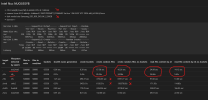This is a performance tester for datastores of your PBS.
-> Intended before you setup a production PBS. <-
- Read how/what/and why we test in this way: https://github.com/egandro/pbs-storage-perf-test/blob/main/README.md
- Our results: https://github.com/egandro/pbs-storage-perf-test/blob/main/results.md
- Our conclusion: https://github.com/egandro/pbs-storage-perf-test/blob/main/conclusion.md
-> Intended before you setup a production PBS. <-
Bash:
apt-get update
apt-get install git
git clone https://github.com/egandro/pbs-storage-perf-test.git
cd pbs-storage-perf-test
# replace datastore-dir with your own directory
./create_random_chunks.py /datastore-dir
rm -rf /datastore-dir/dummy-chunks- Read how/what/and why we test in this way: https://github.com/egandro/pbs-storage-perf-test/blob/main/README.md
- Our results: https://github.com/egandro/pbs-storage-perf-test/blob/main/results.md
- Our conclusion: https://github.com/egandro/pbs-storage-perf-test/blob/main/conclusion.md


